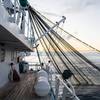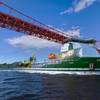Hidden Exposures Can Sink a Business
Insurance: Ship Repairers and Marine Equipment Installers
Operating on both land and water, ship repairers and marine equipment installers tackle a variety of tasks from general maintenance and repair, to upgrading electrical systems, to installing state-of-the-art navigational systems. Along with these tasks comes a wide array of maritime risk exposures, both large and small, for which the business owner needs to be adequately protected.
The tasks of an electrician or welder are challenging enough on their own, but try to do this work on a vessel at sea or in a shipyard, and the technician will find that the hazard level rises dramatically – from making sure that all facets of the systems work together as they should, to the increased fire risk hot welding presents to the safety of the vessel. As a result, only professional installers with a maritime background should be considered for such work. Vessel owners and shipyards should be sure to contract only with ship repairers and installers who have comprehensive insurance that will not only protect that business, but also provide coverage for the vessel or shipyard if the installer is found responsible for any damage. The exposure for vessels in their care, custody, and control, along with any other potential third-party property damage must be addressed.
While most ship repairers and installers recognize these exposures, good coverage is not always easy to find for high-hazard businesses like these. Some insurers shy away from underwriting these businesses due to the high-risk nature of their work. Others may be willing to insure these maritime service companies, but may not have the marine expertise – or the appetite – to understand and provide coverage for some of the “hidden” exposures of the business. By understanding how underwriters assess risk, and by implementing proper risk control measures, marine businesses will have more options when it comes to choosing an insurer that has the expertise to uncover the hidden exposures threatening their business.
The Underwriting Process
An insurer with extensive ocean marine experience will closely examine risk exposures facing the business and place particular emphasis on five key criteria:
1- Work Performed
Some companies may choose not to insure repair businesses that undertake welding jobs because the “hot” work carries too much fire risk, or the technical repairs and installation of critical systems on a vessel may be too great. When assessing the work performed, underwriters will examine a number of factors, including how they approach these complex tasks, how they document their work, and what safety programs they employ.
2- Location
On shore, marine repairers and installers may have to be concerned not only with the vessel on which they are operating, but also with any surrounding property that could present liability exposures. In water, underwriters will look at the parts of the vessel where the work is being performed – whether it is a control room, high atop the vessel, or underwater beneath the vessel – and assess the risk there along with the potential risk of damaging any adjacent vessels or property.
3- Experience
Experience should always be a critical factor in hiring someone for any job, and the same holds true when it comes to insuring marine repair businesses. Underwriters will consider whether the technicians are skilled and knowledgeable and what level of experience they have on similar projects. While proper training is key for a good ship repairer, often the time spent on the job can build his or her level of expertise and reduce his likelihood of an accident. Considerable experience in more hazardous marine repair work like welding or heavy engine or system repair may lead an underwriter to consider writing a policy for a high-risk business that otherwise may have been declined.
4- Contractual Issues
When working on someone else’s vessel, a contract must be involved. Underwriters will look at not only whether a contract is in place to manage third party exposures, but how the repair business executes that contract, how they communicate that contract to the team, and how they incorporate changes to each project into the contract. Evidence of proper contractual risk transfer will be closely evaluated. Finally, insurers will look to cover contractual obligations that pertain only to the operations of their Insured.
5- Product Liability Exposures
The installation of a piece of equipment a ship repairer or installer did not manufacture themself carries its own set of risks. If a ship repairer were to install a new radar device – manufactured elsewhere – on a vessel that shorts out and causes damage to the vessel, the installer could be held liable. An experienced marine underwriter will examine this risk exposure, and make sure the ship repairer has the proper controls in place.
Risk Control Measures to Shore up a Ship Repairer’s Business
Underwriters understand there is risk involved in any ship repair business, but those businesses that can demonstrate the quality of their operations through solid risk control practices will likely qualify for extensive coverage at a reasonable premium. A ship repairer can prepare the business for evaluation by implementing proven risk control measures, including the following:
• A Solid Contract. A good contract should accurately reflect the job description and appropriately manage third party exposures. A smaller business, often anxious for a paycheck, may be quick to accept too much (and improper) liability. Ship repair companies should work with qualified legal counsel and their agent or broker to ensure they are taking on an appropriate share of the risk. Any changes to the scope of work must be immediately added to the contract to protect the business.
• Fire Protection. Fire is one of the most dangerous and likely risks a ship repairer can face. Proper fire watch and training programs can help to greatly reduce accident potential.
• Understanding Vessel Idiosyncrasies. Training programs can help workers better understand the idiosyncrasies of the vessels on which they may be performing job functions. Such knowledge could play a key role in reducing the potential risk for dangerous and costly accidents.
• Avoiding Product Modifications. Evaluating products used and whether workers are “customizing” the equipment to fit certain jobs can be key to managing risk. Ship repairers should assess these risks and consider alternatives.
Finding the Right Partner
When looking for a marine insurer, the insurance agent should understand the ocean marine business and work with carriers who have extensive experience in developing proper coverage and risk management solutions for ocean marine policyholders.
It is key to find an insurer with expertise in managing third party risk exposure, coordinating both marine and on-shore coverage, and using risk control and claim teams that specialize in ocean marine. Finding the right insurance partner can mean added protection – and less risk – for ship repairers, enabling them to focus on their business and their customers’ needs.
(As published in the October 2013 edition of Maritime Reporter & Engineering News - www.marinelink.com)













